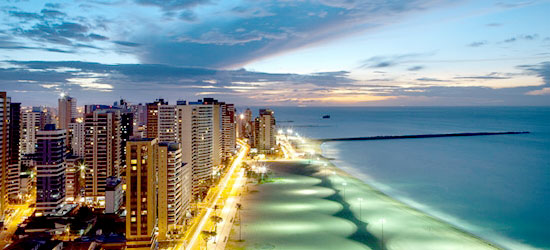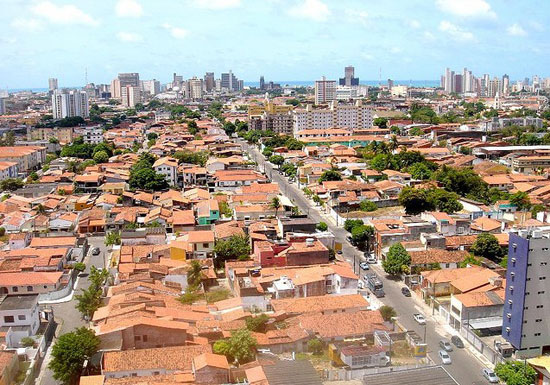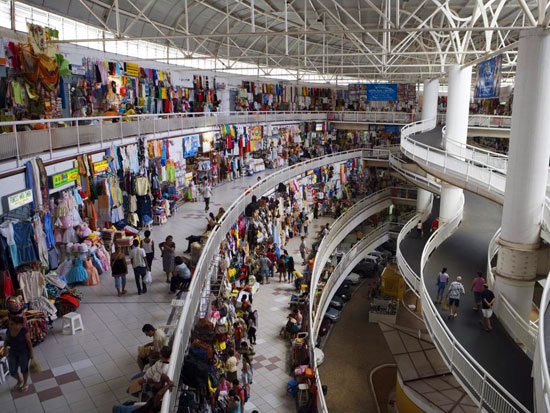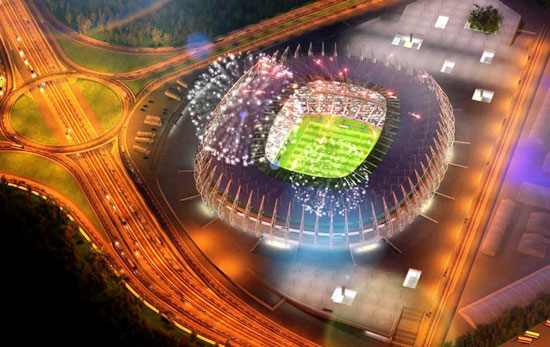Fortaleza(Estadio Castelao)
Although it was officially founded as a village in 1726, and would only become the capital of Ceará in 1799, Fortaleza (Portuguese for ‘fortress') owes its name to the period between 1637 to 1654, when it was controlled by the Dutch, who built the Schoonenborch Fort.

Featuring 34 kilometres of wonderful beaches, Fortaleza has been one of the main tourist destinations in the north-east of Brazil for several years. It has also developed into an important economic centre and a densely populated metropolitan area: over 2.4 million people reside within its 313 square kilometres (120,8 sq mi).

Most of the tourist attractions in Fortaleza revolve around its beaches: the Praia do Futuro (Future Beach) popular for its several barracas - simple kiosk-restaurants built on the sand that serve fresh, typical seafood - while Iracema is the place for bars and nightclubs. There is also more bucolic Mucuripe Beach, from where fishermen venture into the sea with their jangadas (handmade wooden boats). The coastal Beira Mar avenue is also the place for a traditional daily craftsmen's fair and for some of the top spots to dance the forró, a typical rhythm from the north-east of Brazil.

Over the decades, Fortaleza has invested in infra-structure for tourism and in new features such as the Centro Dragão do Mar de Arte e Cultura (Sea Dragon Art and Culture Centre) and the Beach Park, Brazil's largest water park, with several cutting-edge speed-slides distributed along 35,000 square kilometres.

Football
Two of the most popular clubs from the north-east of Brazil come from Fortaleza: Ceara Sporting Club and Fortaleza Esporte Clube. Both teams have historically shared the attention of the fans throughout the whole state of Ceará, as well as the state titles.
The two sides have also played memorable roles in national competitions: Ceará were the runner-ups in the Copa do Brasil in 1994, when they lost to Gremio, and they reached the semi finals in 2005, while Fortaleza finished runners-up twice in the Taca Brasil (a predecessor to the Campeonato Brasileiro), in 1960 and 1968.
The city of Fortaleza offers two main stadiums for the matches involving Ceara, Fortaleza and Ferroviário Esporte Clube: the state-owned Plácido Castelo, also known as the Castelão, and the city-owned Presidente Vargas. The Castelão has been revamped and expanded to host over 58,000 fans at Brazil 2014.
Owner: Ceara, Fortaleza EC CE
Capacity: 64846
Country: Brazil
City: Fortaleza
Address: Avenida Alberto Craveiro, 2901 - Castelão, Fortaleza - CE, 60860-000, Brazil
Value: About $240 million
Inauguration: 1973
Average temperature in June: 29.6°C

Profile
The people of Fortaleza have a passion for the game as well as the city’s two biggest clubs, Ceara and Fortaleza. And it is an attachment that can only grow with the remodelling of the city’s main football stadium, the Castelao.
Built in 1973 and officially known as the Estadio Governador Placido Castelo, the Castelao is home to both teams and has been entirely renovated to host matches at the FIFA Confederations Cup Brazil 2013 and the 2014 FIFA World Cup Brazil.
As well as having its capacity increased to 58,704, the revamped stadium will boast an underground car park with 1,900 spaces, executive boxes, a VIP area, media centre, mixed zone and fully refurbished dressing rooms. In addition, a new roof now covers all its tiers, including the pitchside ring of seating.
Access to the Castelao has also been upgraded, with the creation of four exclusive bus lanes, an LRV (light rail vehicle) line and two metro stations, making it far easier for fans to reach the stadium and the complex it will form part of, which will house restaurants, cinemas, a hotel and an Olympic centre.
The Castelao is the venue for A Seleção’s second group match at Brazil 2014. The support the home favourites receive is sure to be every bit as fervent as it was when they ran out there for a March 2002 friendly against Yugoslavia, the game that marked Ronaldo’s long-awaited return to action in the build-up to Brazil’s triumph at the 2002 FIFA World Cup Korea/Japan.
Matches:
14/06/2014 16:00 Uruguay vs. Costa Rica
17/06/2014 16:00 Brazil vs. Mexico
21/06/2014 17:00 Germany vs. Ghana
24/06/2014 17:00 Greece vs. Ivory Coast
29/06/2014 13:00 Round of 16 1B vs. 2A
04/07/2014 17:00 Quarter-finals W49 vs. W50
Local hero:
Bolton Wanderers fans may remember Mario Jardel with a shudder, or a chuckle. Cruelly nicknamed 'Lardel' due to his hefty waistline, the forward only made seven appearances under Sam Allardyce.

Legends pay tribute to Gerrard & Lahm
International retirements follow Wo...
- Year
- Winner
- Runner-up
- Third place
